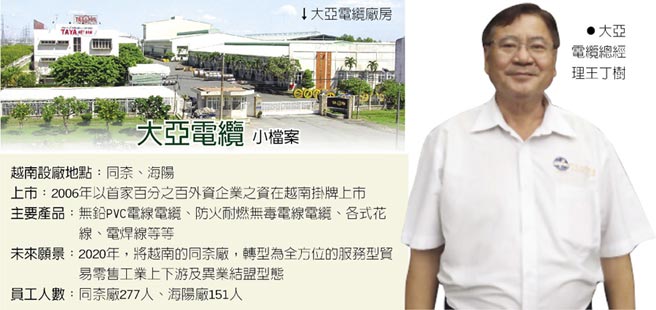Wang, Ting-Shu: Ta Ya Won Recognition by the Local Government for Doing our Social Responsibilities [Commercial Times]

2017/05/26
The recent years have seen many China-based Taiwanese companies taking a big step and entering the Vietnamese market. In a time when the land and labor cost in China are rising drastically, with the surging environmental protection awareness, these Taiwanese companies turn to Vietnam for alternative manufacturing bases. Of these Taiwanese companies, Ta Ya Group is among the first to transfer to Vietnam as a deployment strategy. As early as the 1990s, Ta Ya Group’s deployment in China started in Dongguan, followed by Kunshan and Zhangzhou, next it extended to Tỉnh Đồng Nai and Tỉnh Hải Dương in Vietnam. Twenty odd years later, Ta Ya Electric Wire and Cable Co., Ltd. has been listed on the Vietnamese stock market since 2006 as Vietnam’s first wholly foreign-owned enterprise. This is seen as a new milestone for Taiwanese companies.
Looking back over this process, Ta Ya Group points out that during the 1980s when they first set up factories in China’s Dongguan, Taiwan was undergoing an industrial transformation in the second half of the 1980s, and many enterprises were seeking alternative production lines via simultaneous overseas deployment. Later on when the Taiwanese government loosened the foreign exchange control, it spelled another opportunity for enterprises to expand overseas production bases. At the time, while many Taiwanese companies saw the Mainland Chinese market as the first target of their advances, Ta Ya Group was already contemplating over the need of spreading productions lines over to the Southeast Asia for the sake of investment risk diversification, on the other hand.
Subsequently, given all contributing factors, Ta Ya group set up its first factory in Vietnam’s Tỉnh Đồng Nai in 1994, and later on another factory in Tỉnh Hải Dương, north Vietnam in 2003. Today,Ta Ya Group has not only accomplished the amazing feat of becoming Vietnam’s first wholly foreign-owned enterprise but also duly fulfilled its local social responsibilities as a foreign-owned enterprise. In line with the economic developments in Vietnam, Ta Ya Group’s product range has grown to include LV and MV electric power cables, lead-free environmentally-friendly cables and enameled magnet wires, while maintaining high quality and offering annual scholarships to employees’ children at adjacent universities. Ta Ya Group has consequently received much recognition from the Vietnamese Government, as well as obtaining the “National Quality Gold Award” awarded by the Vietnamese Government in 2013 and 2016, which sends out a positive image of Taiwan as a country and raises the profile of Taiwanese companies in the local community.
The neighboring Cambodia and Myanmar are considered as the nations for future production base deployment. As such, Ta Ya Electric Wire & Cable Co., Ltd. has since set up distribution bases in Myanmar. Ta Ya’s General Manager, Wang, Ting-Shu considers that Cambodia, Vietnam, Laos, Thailand and Myanmar are all close to each other, and such geographic proximity enables convenient connections between production lines and supply transport.
Speaking of Hua Nan Bank’s assistance to the Ta Ya Group over the years, Wang, Ting-Shu points out that besides financing, what Hua Nan Bank impresses him the most is their legal advices. Considering the local legal restrictions, Ta Ya Group often turns to Hua Nan Bank for consultation. Further, the foreign exchange in Hua Nan Bank is highly efficient, which is critical to the procurement of imported raw materials.
On the subject of (Taiwanese) young people working in the Association of Southeast Asian Nations (ASEAN), Wang, Ting-Shu takes Ta Ya Electric Wire & Cable Co., Ltd. for instance and said, “We currently have 25 Vietnamese cadres and 7 Taiwanese cadres. Three out of these 7 Taiwanese staff are in their 20s, and one of them came to Vietnam at the age of 23. This goes to show that young people nowadays think very highly of working in Vietnam as a chance to develop a career locally. For these young staff, the company also pays much attention to their leisure quality after the work hours. For instance, Ta Ya Group has hosted two consecutive Ta Ya Cup International Basketball Competitions. Players invited to compete are all staff of local foreign enterprises from Japan, Korea, the US and the Philippines. Wang thinks that by attending such healthy activities, the young staff in Vietnam has a chance for physical and mental relaxation and balanced general wellbeing.
When working in the ASEAN, is language a barrier? Wang, Ting-Shu states with full confidence that now we have much better language learning environments than ever before, particularly the lively application of video conferencing as a language teaching tool. Right now in Taiwan, there are Vietnamese classes conducted by the Department of East Asian Languages and Literature of the National Kaohsiung University and many language centers in various places. The local Normal Universities in Vietnam also offer language classes to foreign students. In this regard, Wang, Ting-Shu explains that he has employed an alumnus from a Vietnamese Normal University to teach his Taiwanese staff Vietnamese, and additionally, he invited former Vietnamese staff in a Taiwan-owned non-life insurance company to teach his Vietnamese staff Chinese. This dual-way teaching practice is conducive to better communication between the Taiwanese and Vietnamese staff.
Regarding the wage costs in Vietnam, Wang, Ting-Shu says candidly that there has been a major boost in recent years. For instance, in Vietnam’s Tier-1 industrial parks, the monthly salary averages US$155 per person, with an increase of 12% last year, lower in comparison to the annual increase of 15% in previous years. This is an inevitable trend. With regards to the (Taiwanese) Government currently actively promoting the New Southbound Policy, Wang Dingshu suggests that in face of the rapidly surging ASEAN economic entity, Taiwanese enterprises need to undergo self-improvement, as well as rely on attention and assistance of the Government and the relevant departments stationed overseas. Further, Wang suggests that the Government can coordinate and assist the ASEAN in expanding their infrastructure in order to nurture certain relevant Taiwanese corporates in overseas technological support. With the infrastructure in place, Taiwanese companies will thus have more favorable conditions to operate in these countries.
Source

